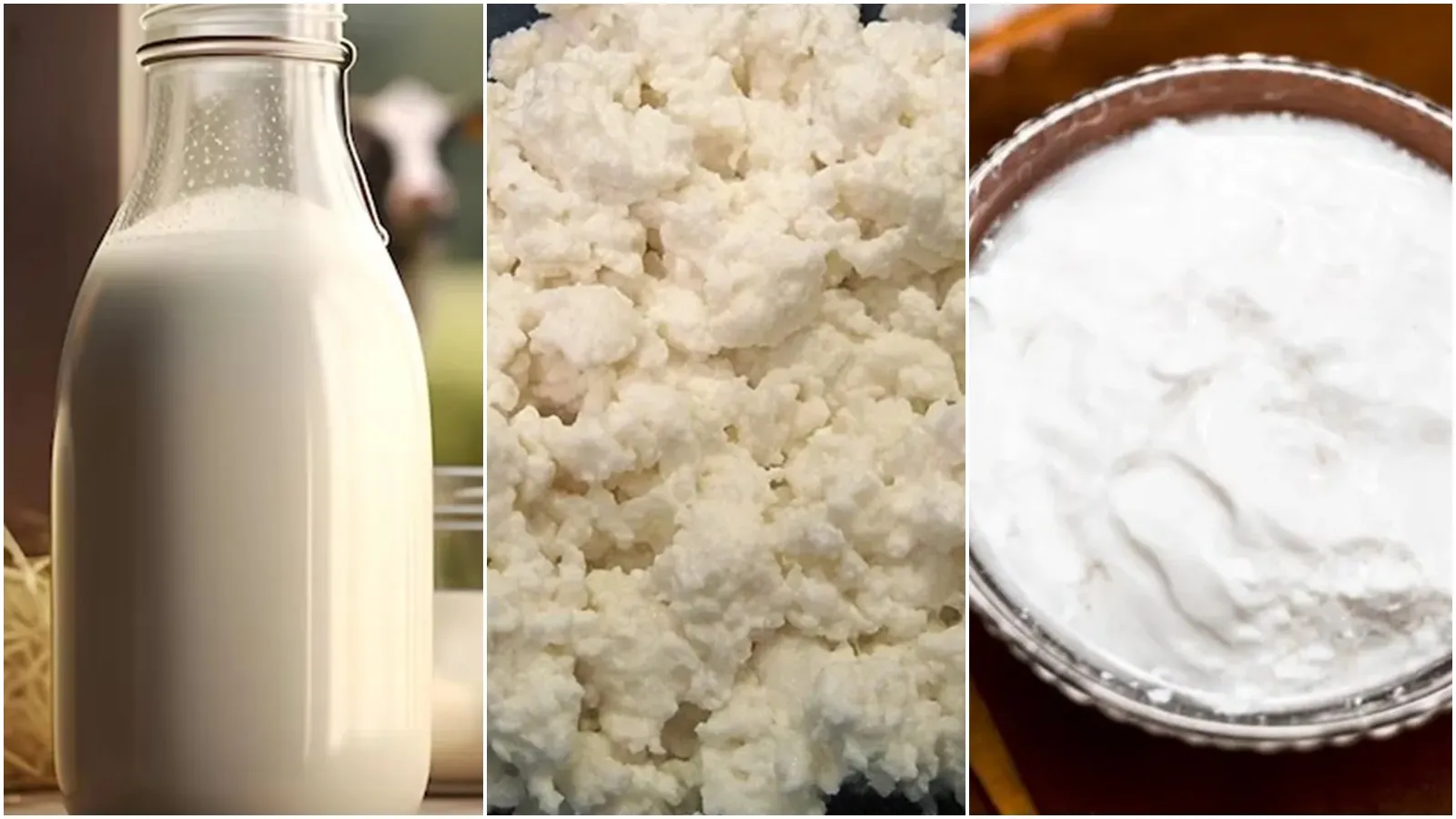Share This Article
For lovers of dairy, choosing between milk, paneer, and curd can be hard. But have you ever thought about which might be healthiest for you, basis your nutritional needs, preferences, and dietary restrictions? Worry not, we will help you find the answer to that today.
“Milk, paneer, and curd have health benefits according to their nutrition profiles,” said dietitian and nutritionist Tanvee Singh.
Milk is known to help build healthy bones and keep a check on high blood pressure due to its potassium content.
Nutrient properties present in milk
• On average, 250 ml of fat-free milk contains 90 calories and 9 gm of protein. • A cup of fat-free milk contains 8 per cent vitamin B12 and 2 per cent vitamin A, along with 12 per cent calcium, 1 per cent sodium, 2 per cent magnesium, and 4 per cent potassium.
According to Ayurveda, the nutrition provided by milk cannot be derived from any other food. “Milk, when digested properly, nourishes all the tissues, promotes balanced emotions, and helps balance all the doshas. It is one of the most important foods to promote ojas,” said Singh.
To digest it properly, avoid drinking chilled milk. “Milk should be brought to a boil. Allow it to foam up, and then bring the heat down such that it is on a slow boil for about 5 to 10 minutes. Heating milk changes its molecular structure making it easier for human consumption, and also reduces its kapha, making it lighter to digest,” said Singh.
With its high protein content and essential nutrients, paneer is not only a source of strength and sustenance but also plays a crucial role in supporting digestive health and bolstering the immune system. “Paneer is an excellent source of protein, which is essential for meeting day-to-day needs, muscle building, repair, and overall bodily functions. Paneer is a suitable option for those following low-carb diets,” said Ramya B, registered dietitian, Cloudnine Group of Hospitals, Chennai, OMR Branch.
*Nutritional content of paneer includes
Calories 321 Protein 25 grams Fat 25 grams Carbohydrates 3.57 grams
Curd is easier to digest as compared to milk and keeps you fuller for longer. “Filled with good bacteria, curd helps in cleaning the digestive tract and also keeps infections at bay,” said Singh.
Nutrient properties present in curd
*A cup of fat-free curd may have over 98 calories and 11 g of protein. *A cup of fat-free curd contains vitamins in the same quantity as that in milk, which is 8 per cent vitamin-B12 and 2 per cent vitamin A. •Comparing other properties, a cup of fat free curd has around 8 per cent calcium, 15 per cent sodium, 2 per cent magnesium and 2 per cent potassium.
According to Ayurveda, there are different rules for consuming curd, said Singh.
*Curd should not be consumed at night. *Daily consumption of curd is prohibited. “It is because curd is known to be heavy and increases inflammation in the body. When there is inflammation in your body, the kapha and pitta dosha also increase, which is not good for health. Hence avoid consuming curd daily. If you feel like it, consume buttermilk every alternate day,” said Singh.
Also, people with bleeding disorders should avoid curd. “Curd is hot in potency and can increase the pitta dosha of a person. Thus, if you have heavy period flow or nasal bleeding, it is best to avoid curd in your meals,” said Singh.
Considering there is not much difference between the nutritional values of the three, it is best to have milk daily (if not milk intolerant), paneer once a week, and curd about 2-3 days in a week,” said Singh.
Each dairy product has its unique advantages. Incorporating a variety into your diet can help you reap the benefits of each while providing a balanced intake of essential nutrients.
According to Ramya,
*For bone health: Milk and curd are excellent due to their high calcium and vitamin D content. *For muscle building: Paneer and milk provide good protein, essential for muscle repair and growth. *For gut health: Curd is the best choice, thanks to its probiotic content, which supports digestion and immune health. *For lactose intolerance: Curd is generally better tolerated, but lactose-free milk options are also available.
Milk is better tolerated if taken in fermented form (buttermilk) and paneer is good to increase your protein in concentrated form, especially for sports persons and young children, mentioned Neena Luthra, nutritionist at Nutrisolution- The Diet Clinique, adding that curd contains lower amounts of lactose when compared to fresh milk.
Trump appoints Tulsi Gabbard, a former Democrat who endorsed him in the 2024 elections, as the new director of National Intelligence. Despite her lack of experience, Trump praises her service and expects her to bring a “fearless spirit” to the intelligence community. Gabbard thanks Trump and vows to defend American freedoms, having previously left the Democratic party due to their warmongering.
This No Is Already Registered.
Thanks For Registered Mobile No.



